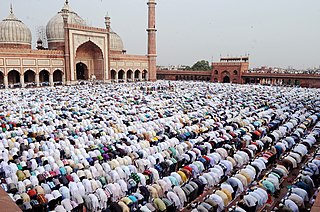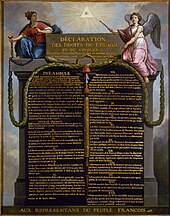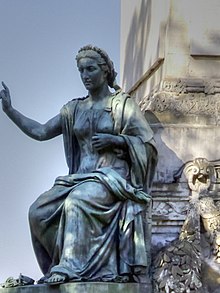
A | B | C | D | E | F | G | H | CH | I | J | K | L | M | N | O | P | Q | R | S | T | U | V | W | X | Y | Z | 0 | 1 | 2 | 3 | 4 | 5 | 6 | 7 | 8 | 9
| Freedom of religion |
|---|
| Religion portal |
| Part of a series on |
| Liberalism |
|---|
 |

Freedom of religion or religious liberty is a principle that supports the freedom of an individual or community, in public or private, to manifest religion or belief in teaching, practice, worship, and observance. It also includes the right not to profess any religion or belief[1] or "not to practise a religion" (often called freedom from religion).[2]
The concept of religious liberty includes, and some say requires, secular liberalism, and excludes authoritarian versions of secularism.[3][4][5]
Freedom of religion is considered by many people and most nations to be a fundamental human right.[6][7] Freedom of religion is protected in all the most important international human rights conventions, such as the United Nations International Covenant on Civil and Political Rights, the American Convention on Human Rights, the European Convention on Human Rights, and the United Nations Convention on the Rights of the Child. In a country with a state religion, freedom of religion is generally considered to mean that the government permits religious practices of other communities besides the state religion, and does not persecute believers in other faiths or those who have no faith; in other countries, freedom of religion includes the right to refuse to support, by taxes or otherwise, a state religion.
Freedom of religion includes and may go beyond freedom of belief (this freedom is usually limited to the right to believe whatever a person, group, or religion wishes). Rather, freedom of religion includes, freedom of practice, the right to practice the religion or belief openly and outwardly in a public manner, which some believe is a central facet of religious freedom.[8] A third term, freedom of worship is of uncertain definition and may be considered to fall between the two terms. The term "belief" is considered inclusive of all forms of irreligion, including atheism, humanism, existentialism or other schools of thought. Whether non-believers or humanists should be considered for the purposes of freedom of religion is a contested question in legal and constitutional contexts. Crucial in the consideration of this liberty is the question of whether religious practices and motivated actions which would otherwise violate secular law should be permitted due to the safeguarding freedom of religion, considered in e.g., (in American jurisprudence) Reynolds v. United States or Wisconsin v. Yoder, (in European law) S.A.S. v. France, and numerous other jurisdictions.
History

In a historic setting freedom to worship has often been limited in practice through punitive taxation, repressive social legislation, and political disenfranchisement. An example commonly cited by scholars is the status of dhimmis under Islamic sharia law. Stemming from the Pact of Umar and literally meaning "protected individuals", it is often argued that non-Muslims possessing the dhimmi status in medieval Islamic societies enjoyed greater freedoms than non-Christians in most medieval European societies, while duly noting that the protection was limited because of regulation by and obligations to government such as taxation (compare jizya and zakat) and military service differed between religions. In modern concepts of religious freedom, the law is usually blind to religious affiliation.

In Antiquity, a syncretic point of view often allowed communities of traders to operate under their own customs. When street mobs of separate quarters clashed in a Hellenistic or Roman city, the issue was generally perceived to be an infringement of community rights.
Cyrus the Great established the Achaemenid Empire ca. 550 BC, and initiated a general policy of permitting religious freedom throughout the empire, documenting this on the Cyrus Cylinder.[9][10]
Freedom of religious worship was established in the Buddhist Maurya Empire of ancient India by Ashoka the Great in the 3rd century BC, which was encapsulated in the Edicts of Ashoka.
Greek–Jewish clashes at Cyrene in 73 AD and 117 AD and in Alexandria in 115 AD provide examples of cosmopolitan cities as scenes of tumult.
Genghis Khan was one of the first rulers who in 13th century enacted a law explicitly guaranteeing religious freedom to everyone and every religion.[11]
Ancient Roman policy
The Romans tolerated most religions, including Judaism, and encouraged local subjects to continue worshipping their own gods. They did not however, tolerate Christianity, because of the Christian refusal to offer honours to the official cult of the emperor, until it was legalised by the Roman emperor Galerius in 311. Holmes and Bickers note that as long as Christianity was treated as a part of Judaism, which was generally tolerated because of its antiquity and its practice of making offers on behalf of the emperor, it enjoyed the same freedom, but the Christian claim to religious exclusivity meant its followers found themselves subject to hostility.[12] [13]
The early Christian apologist Tertullian was the first-known writer referring to the term libertas religionis.[14] The Edict of Milan guaranteed freedom of religion in the Roman Empire until the Edict of Thessalonica in 380, which outlawed all religions except Christianity.
India
Religious tolerance in India: A legacy of the past and a promise for the future
Ancient Jews fleeing from persecution in their homeland 2,500 years ago settled in modern-day India and never faced anti-Semitism.[15] Freedom of religion edicts have been found written during Ashoka the Great's reign in the 3rd century BC. Freedom to practise, preach and propagate any religion is a constitutional right in Republic of India. Most major religious festivals of the main communities are included in the list of national holidays.
Many scholars and intellectuals believe that India's predominant religion, Hinduism, has long been a most tolerant religion.[16] Rajni Kothari, founder of the Centre for the Study of Developing Societies has written, " is a country built on the foundations of a civilisation that is fundamentally non-religious."[17]
The Dalai Lama, the Tibetan leader in exile, said that religious tolerance of 'Aryabhoomi,' a reference to India found in the Mahabharata, has been in existence in this country from thousands of years. "Not only Hinduism, Jainism, Buddhism, Sikhism which are the native religions but also Christianity and Islam have flourished here. Religious tolerance is inherent in Indian tradition," the Dalai Lama said.[18]
Freedom of religion in the Indian subcontinent is exemplified by the reign of King Piyadasi (304–232 BC) (Ashoka). One of King Ashoka's main concerns was to reform governmental institutes and exercise moral principles in his attempt to create a just and humane society. Later he promoted the principles of Buddhism, and the creation of a just, understanding and fair society was held as an important principle for many ancient rulers of this time in the East.
The importance of freedom of worship in India was encapsulated in an inscription of Ashoka:
King Piyadasi (Ashok) dear to the Gods, honours all sects, the ascetics (hermits) or those who dwell at home, he honours them with charity and in other ways. But the King, dear to the Gods, attributes less importance to this charity and these honours than to the vow of seeing the reign of virtues, which constitutes the essential part of them. For all these virtues there is a common source, modesty of speech. That is to say, one must not exalt one's creed discrediting all others, nor must one degrade these others without legitimate reasons. One must, on the contrary, render to other creeds the honour befitting them.
On the main Asian continent, the Mongols were tolerant of religions. People could worship as they wished freely and openly.
After the arrival of Europeans, Christians in their zeal to convert local as per belief in conversion as service of God, have also been seen to fall into frivolous methods since their arrival, though by and large there are hardly any reports of law and order disturbance from mobs with Christian beliefs, except perhaps in the north eastern region of India.[19]
Freedom of religion in contemporary India is a fundamental right guaranteed under Article 25 of the nation's constitution. Accordingly, every citizen of India has a right to profess, practice and propagate their religions peacefully.[20]
In September 2010, the Indian state of Kerala's State Election Commissioner announced that "Religious heads cannot issue calls to vote for members of a particular community or to defeat the nonbelievers".[21] The Catholic Church comprising Latin, Syro-Malabar and Syro-Malankara rites used to give clear directions to the faithful on exercising their franchise during elections through pastoral letters issued by bishops or council of bishops. The pastoral letter issued by Kerala Catholic Bishops' Council (KCBC) on the eve of the poll urged the faithful to shun atheists.[21]
Even today, despite religious tensions and violence, most Indians celebrate all religious festivals with equal enthusiasm and respect. Hindu festivals like Deepavali and Holi, Muslim festivals like Eid al-Fitr, Eid-Ul-Adha, Muharram, Christian festivals like Christmas and other festivals like Buddha Purnima, Mahavir Jayanti, Gur Purab etc. are celebrated and enjoyed by all Indians.
Europe
Religious intolerance

Most Roman Catholic kingdoms kept a tight rein on religious expression throughout the Middle Ages. Jews were alternately tolerated and persecuted, the most notable examples of the latter being the expulsion of all Jews from Spain in 1492. Some of those who remained and converted were tried as heretics in the Inquisition for allegedly practicing Judaism in secret. Despite the persecution of Jews, they were the most tolerated non-Catholic faith in Europe.
However, the latter was in part a reaction to the growing movement that became the Reformation. As early as 1380, John Wycliffe in England denied transubstantiation and began his translation of the Bible into English. He was condemned in a papal bull in 1410, and all his books were burned.
Zdroj:https://en.wikipedia.org?pojem=Religious_rights
Text je dostupný za podmienok Creative Commons Attribution/Share-Alike License 3.0 Unported; prípadne za ďalších podmienok. Podrobnejšie informácie nájdete na stránke Podmienky použitia.
Antropológia
Aplikované vedy
Bibliometria
Dejiny vedy
Encyklopédie
Filozofia vedy
Forenzné vedy
Humanitné vedy
Knižničná veda
Kryogenika
Kryptológia
Kulturológia
Literárna veda
Medzidisciplinárne oblasti
Metódy kvantitatívnej analýzy
Metavedy
Metodika
Text je dostupný za podmienok Creative
Commons Attribution/Share-Alike License 3.0 Unported; prípadne za ďalších
podmienok.
Podrobnejšie informácie nájdete na stránke Podmienky
použitia.
www.astronomia.sk | www.biologia.sk | www.botanika.sk | www.dejiny.sk | www.economy.sk | www.elektrotechnika.sk | www.estetika.sk | www.farmakologia.sk | www.filozofia.sk | Fyzika | www.futurologia.sk | www.genetika.sk | www.chemia.sk | www.lingvistika.sk | www.politologia.sk | www.psychologia.sk | www.sexuologia.sk | www.sociologia.sk | www.veda.sk I www.zoologia.sk
